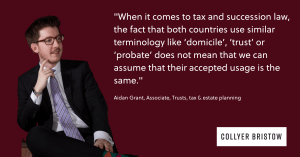- International trusts, tax and estate planning
- UK/USA Tax & estate planning

Longer Reads
What advisers can do to help clients hit by the US/UK double tax treaty
Private Wealth Associate Aidan Grant considers the plight of individuals exposed to double taxation as a UK resident and a US citizen, and how some of the most common pitfalls can be avoided.
3 minute read
Published 18 February 2021
Key information
Unlike most other jurisdictions worldwide, the US levies tax based on citizenship.
This means that a US citizen living in the UK can be simultaneously exposed to UK
tax as a UK resident and US tax as a US citizen. This article considers the plight of
these individuals, how they are exposed to double taxation and how some of the
most common pitfalls can be avoided.
The UK resident US citizen
We assume that a UK resident US citizen (P) has retained a US domicile because he
does not intend to stay in the UK permanently. Until P has been UK resident for 15 of
the last 20 tax years, he is neither UK domiciled nor deemed domiciled and so is
eligible to be taxed on the remittance basis of taxation.
This means that P only suffers UK tax on UK-source income and capital gains or on
foreign-source income or capital gains that are remitted to the UK by P or a ‘relevant
persons’, a class that includes P’s spouse and minor children.
P may have been warned of this risk of UK tax on the remittance of foreign funds,
and consequently decided to shield his foreign-source income and capital gains from
UK tax. However, those same funds likely also suffered US tax as they arose. This
means that P is exposed to double taxation should he ever decide he needs those
funds in the UK after all, i.e. once to US tax when the funds arose, and then again to
UK tax on remitting the funds.
However, on the later remittance of those funds double taxation relief will likely not be
available under the US/UK double tax treaty (DTT) because the US and UK taxes
arise in different tax years. Practically speaking, this means P is locked out of
remitting funds into UK without paying tax a second time.
Instead, P should consider remitting foreign-source income and capital gains in the
UK tax year in which they arise and where those funds have already suffered US tax.
In such circumstances, although UK tax would also be due, a credit should be
available under the DTT.
Since the rates of tax on income and capital gains are currently relatively similar in
the US and UK, P would only pay UK tax where the relevant UK tax rate is higher
than the corresponding US rate, and even then only on the balance. P would have
therefore made those funds available in UK for (at most) only a little additional tax.,
Alternatively, P should consider whether it is even worth claiming the remittance
basis, given that his worldwide income and capital gains are already taxed in the US.
Additionally, once P has been UK resident for seven of the last nine tax years, he
must pay the annual remittance basis charge (starting at £30,000), further
decreasing the potential efficiency.
The double domiciliary
P will become deemed UK domiciled once he has been UK resident for 15 of the last
20 tax years. Foreign-source income and capital gains generated after this date can
be freely remitted, since these will be taxed in both jurisdictions on an arising basis
and a credit should be available (although foreign-source income and capital gains
that arose before P become deemed domiciled will continue to suffer UK tax upon
their remittance).
P now also needs to consider his domicile position. He is a UK domiciliary for UK
purposes (as he is deemed domiciled), but he is also a US domiciliary for US
purposes (as a US citizen). Therefore, the US and UK will each seek to tax P’s
worldwide estate to estate tax and inheritance tax respectively. In order to avoid
double taxation P must look to the US/UK estate and gift tax treaty (EGTT).
Before P became deemed UK domiciled, the EGTT stated that the US had primary
taxation rights on his worldwide assets as a US domiciliary, with the exception of UK
real property or the UK business property of a UK permanent establishment (over
which the UK always retains primary taxation rights). Note, that this position would
be more complex if P were also a UK citizen.
Now that P is a domiciliary of both jurisdictions, the EGTT determines which
jurisdiction has primary taxation rights. In P’s circumstances, the UK would emerge
the victor since he has been UK resident for a sufficiently long period of time.
However, if P’s residency pattern had been more erratic, or if P held dual US/UK
citizenship, then he must turn to a series of ‘tiebreaker’ provisions, the winner of
which takes the primary taxation rights over most assets.
These tiebreaker provisions test: (1) the location of the individual’s permanent home;
then (2) the jurisdiction to which their personal and economic ties are closer (known
as his ‘centre of vital interests’); then (3) the individual’s habitual abode; and then (4)
their citizenship. Only if a previous test is inconclusive does P proceed to the next
test. If the individual is a citizen of both jurisdictions (or neither) then it is for the IRS
and HMRC to agree between them who has primary taxation rights.
The EGTT and the DTT contain more nuances that can be described in this article in
full. However, as an example of two important nuances:
- The US currently has an estate tax lifetime allowance that is far in excess of the
corresponding UK inheritance tax nil rate band. Before P became deemed UK
domiciled, had P’s estate been under the applicable US estate tax lifetime allowance then no US tax would have been due, despite the fact that the US had primary taxation rights. However, this is foreseen by the EGTT: if the US has primary taxation rights but it does not levy tax due to an available relief or exemption, then the UK is entitled to levy tax. - The DTT and EGTT are concerned primarily with US federal taxes. An individual
may continue to be exposed to US statetaxes that are not relieved by the application of the two treaties. Therefore, if P is a resident of a particular state (even if he is not US resident for federal US purposes), then he must also consider US state taxes. Whether this is practically a problem may depend on whether P’s state is a low tax state (like Florida) or a high tax state (like California).
The key for any US citizen is to plan carefully, ideally in advance of becoming UK
resident for the first time and then in advance of becoming UK domiciled or deemed
domiciled.
That said, clients rarely appreciate when an advisor invokes hindsight and so, where
this is not possible, the client should be reassured that there are always opportunities
for tax efficiency with careful planning.
This article was first published by EPrivateClient in February 2021.
Related content
Longer Reads
What advisers can do to help clients hit by the US/UK double tax treaty
Private Wealth Associate Aidan Grant considers the plight of individuals exposed to double taxation as a UK resident and a US citizen, and how some of the most common pitfalls can be avoided.
Published 18 February 2021
Associated sectors / services
Authors
Unlike most other jurisdictions worldwide, the US levies tax based on citizenship.
This means that a US citizen living in the UK can be simultaneously exposed to UK
tax as a UK resident and US tax as a US citizen. This article considers the plight of
these individuals, how they are exposed to double taxation and how some of the
most common pitfalls can be avoided.
The UK resident US citizen
We assume that a UK resident US citizen (P) has retained a US domicile because he
does not intend to stay in the UK permanently. Until P has been UK resident for 15 of
the last 20 tax years, he is neither UK domiciled nor deemed domiciled and so is
eligible to be taxed on the remittance basis of taxation.
This means that P only suffers UK tax on UK-source income and capital gains or on
foreign-source income or capital gains that are remitted to the UK by P or a ‘relevant
persons’, a class that includes P’s spouse and minor children.
P may have been warned of this risk of UK tax on the remittance of foreign funds,
and consequently decided to shield his foreign-source income and capital gains from
UK tax. However, those same funds likely also suffered US tax as they arose. This
means that P is exposed to double taxation should he ever decide he needs those
funds in the UK after all, i.e. once to US tax when the funds arose, and then again to
UK tax on remitting the funds.
However, on the later remittance of those funds double taxation relief will likely not be
available under the US/UK double tax treaty (DTT) because the US and UK taxes
arise in different tax years. Practically speaking, this means P is locked out of
remitting funds into UK without paying tax a second time.
Instead, P should consider remitting foreign-source income and capital gains in the
UK tax year in which they arise and where those funds have already suffered US tax.
In such circumstances, although UK tax would also be due, a credit should be
available under the DTT.
Since the rates of tax on income and capital gains are currently relatively similar in
the US and UK, P would only pay UK tax where the relevant UK tax rate is higher
than the corresponding US rate, and even then only on the balance. P would have
therefore made those funds available in UK for (at most) only a little additional tax.,
Alternatively, P should consider whether it is even worth claiming the remittance
basis, given that his worldwide income and capital gains are already taxed in the US.
Additionally, once P has been UK resident for seven of the last nine tax years, he
must pay the annual remittance basis charge (starting at £30,000), further
decreasing the potential efficiency.
The double domiciliary
P will become deemed UK domiciled once he has been UK resident for 15 of the last
20 tax years. Foreign-source income and capital gains generated after this date can
be freely remitted, since these will be taxed in both jurisdictions on an arising basis
and a credit should be available (although foreign-source income and capital gains
that arose before P become deemed domiciled will continue to suffer UK tax upon
their remittance).
P now also needs to consider his domicile position. He is a UK domiciliary for UK
purposes (as he is deemed domiciled), but he is also a US domiciliary for US
purposes (as a US citizen). Therefore, the US and UK will each seek to tax P’s
worldwide estate to estate tax and inheritance tax respectively. In order to avoid
double taxation P must look to the US/UK estate and gift tax treaty (EGTT).
Before P became deemed UK domiciled, the EGTT stated that the US had primary
taxation rights on his worldwide assets as a US domiciliary, with the exception of UK
real property or the UK business property of a UK permanent establishment (over
which the UK always retains primary taxation rights). Note, that this position would
be more complex if P were also a UK citizen.
Now that P is a domiciliary of both jurisdictions, the EGTT determines which
jurisdiction has primary taxation rights. In P’s circumstances, the UK would emerge
the victor since he has been UK resident for a sufficiently long period of time.
However, if P’s residency pattern had been more erratic, or if P held dual US/UK
citizenship, then he must turn to a series of ‘tiebreaker’ provisions, the winner of
which takes the primary taxation rights over most assets.
These tiebreaker provisions test: (1) the location of the individual’s permanent home;
then (2) the jurisdiction to which their personal and economic ties are closer (known
as his ‘centre of vital interests’); then (3) the individual’s habitual abode; and then (4)
their citizenship. Only if a previous test is inconclusive does P proceed to the next
test. If the individual is a citizen of both jurisdictions (or neither) then it is for the IRS
and HMRC to agree between them who has primary taxation rights.
The EGTT and the DTT contain more nuances that can be described in this article in
full. However, as an example of two important nuances:
- The US currently has an estate tax lifetime allowance that is far in excess of the
corresponding UK inheritance tax nil rate band. Before P became deemed UK
domiciled, had P’s estate been under the applicable US estate tax lifetime allowance then no US tax would have been due, despite the fact that the US had primary taxation rights. However, this is foreseen by the EGTT: if the US has primary taxation rights but it does not levy tax due to an available relief or exemption, then the UK is entitled to levy tax. - The DTT and EGTT are concerned primarily with US federal taxes. An individual
may continue to be exposed to US statetaxes that are not relieved by the application of the two treaties. Therefore, if P is a resident of a particular state (even if he is not US resident for federal US purposes), then he must also consider US state taxes. Whether this is practically a problem may depend on whether P’s state is a low tax state (like Florida) or a high tax state (like California).
The key for any US citizen is to plan carefully, ideally in advance of becoming UK
resident for the first time and then in advance of becoming UK domiciled or deemed
domiciled.
That said, clients rarely appreciate when an advisor invokes hindsight and so, where
this is not possible, the client should be reassured that there are always opportunities
for tax efficiency with careful planning.
This article was first published by EPrivateClient in February 2021.
Associated sectors / services
- International trusts, tax and estate planning
- UK/USA Tax & estate planning
Authors
Need some more information? Make an enquiry below.
Subscribe
Please add your details and your areas of interest below
Article contributor
Aidan
GrantPartner
Specialising in International trusts, tax & estate planning, Private wealth, UK trusts, tax & estate planning and US/UK Tax & estate planning
Enjoy reading our articles? why not subscribe to notifications so you’ll never miss one?
Subscribe to our articlesMessage us on WhatsApp (calling not available)
Please note that Collyer Bristow provides this service during office hours for general information and enquiries only and that no legal or other professional advice will be provided over the WhatsApp platform. Please also note that if you choose to use this platform your personal data is likely to be processed outside the UK and EEA, including in the US. Appropriate legal or other professional opinion should be taken before taking or omitting to take any action in respect of any specific problem. Collyer Bristow LLP accepts no liability for any loss or damage which may arise from reliance on information provided. All information will be deleted immediately upon completion of a conversation.
Close












































